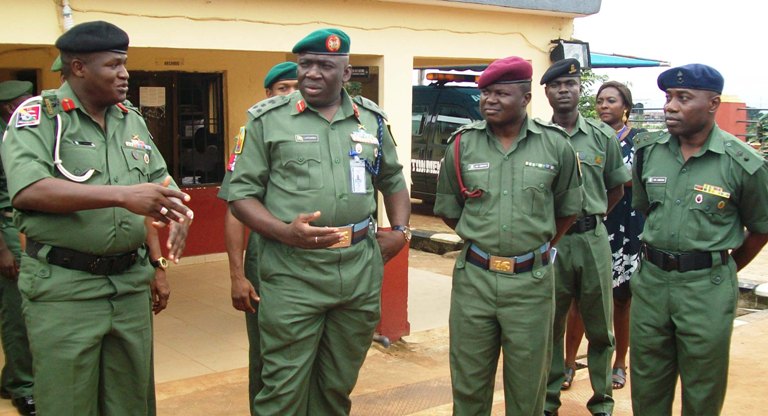It happened in quick successions. The day was December 17, 2015. News had just come over the radio of a court ruling in favour of the release of Nnamdi Kanu, the detained leader of the Indigenous People of Biafra (IPOB).
Jubilant crowds poured out into the streets of Onitsha, the commercial capital of Anambra State. A group of soldiers stationed at the Head Bridge Market opened fire on one of the crowds.
By the time the smoke cleared, three people laid dead with over a dozen sprawled on the ground with gunshot wounds. The soldiers fled the scene but not without taking with them the three corpses.
Warning: Some of the images in this story are of a graphic nature. Viewer discretion is advised.
Later in the afternoon, five more bodies were discovered meters away from the scene bringing to eight the number of people killed on the spot. Of wounded victims taken to hospitals, four later died, bringing to 12 the total number of victims who perished in the fatal shooting.
Three of the dead men were identified as Michael Nweke, 37; Peter Chukwuma Nwankwo, 26; and Mathew Ndukwe Kanu, 25. PREMIUM TIMES gathered that until his death in the hands of soldiers, Michael Nweke was a private security guard employed by the Catholic Reverend Sisters’ Convent at Nkpor in Idemili North local government area of Anambra State. He was a native of Aguekka Village in Ekka Community of Ezza North LGA of Ebonyi State.
ALSO READ: How Nigerian Soldiers Killed And Buried 90 Igbos In Mass Graves At Onitsha Barracks [GRAPHIC PHOTOS]
Peter Chukwuma Nwankwo, an Onitsha-based trader, was a resident of Ezenwankwo Street in Ugwuagba Layout, Obosi. He hailed from Amaokpo in Nssakra Omege Community of Ezza South LGA of Ebonyi State. The third victim Mathew Ndukwe Kanu was an artisan in Onitsha and a resident of Obosi. He was a native of Ndiodo Community in Akanu-Ohafia LGA of Abia State.
Anxious family members went from police stations to mortuaries in search of missing or dead relatives. The search continued into the New Year. Leaving no stone unturned, the search party that included members of IPOB and a human rights organization, Intersociety for Civil Liberties & Rule of Law, hired divers to search the River Niger fearing the corpses might have been dumped in there.
On February 15, 2016, two months after the killings, 31-year old Sunday Nweke, younger brother to Michael Nweke, received a phone call directing him to hurry to the Onitsha General Hospital with a photograph of his late brother. There he met some IPOB members who led him to a mortuary attendant. Sunday identified the body of his late brother. The attendant, whose identity was not revealed, disclosed that some soldiers of the Onitsha Army Barracks, accompanied by some police personnel from the Onitsha Central Police Station, deposited the bodies on December 21, 2015. The attendant claimed he and his colleagues were warned not to say anything or release the corpses to anyone.

Similarly, Frank Chijioke Nwankwo and Grace Onyinyechi Kanu, relations of Peter Chukwuma Nwankwo and Mathew Ndukwe Kanu respectively, received phone calls to come over to the Onitsha General Hospital. They too were able to identify the bodies of their brothers killed two months before.
Traders at the Onitsha Head Bridge Market told PREMIUM TIMES that the ill-fated crowd shot by the soldiers were neither armed nor protesting. Azu Okwuashi, a trader at the market, said there was nothing provocative about the activities of the crowd.
“They were mostly young men who ran out into the street to jubilate when they heard a court had ruled in favour of the release of Nnamdi Kanu. They were not protesting. Why would they protest what for them was a good news?” Mr. Okwuashi said.
Nnamdi Kanu, director of London-based Radio Biafra and leader of separatist Biafran organization, IPOB, was arrested in October 2015 by the State Security Service. The news of his arrest generated mass protests across parts of Enugu State, Delta, Imo, Abia, Cross River, Anambra, Akwa Ibom and Rivers State.
Despite meeting bail conditions, Mr. Kanu is still held, a situation that has continued to agitate his supporters within and outside the IPOB.
Prior to the Onitsha killings, PREMIUM TIMES had on December 2, 2015 reported the Inspector General of Police ordering his anti-riot force to ‘maximally’ restrain pro-Biafran protesters.
Earlier, on November 16, 2015 the General Officer Commanding 3 Division of the Nigerian Army, Major General Hassan Umaru, at a press conference in Maxwell Kobe Cantonment, Rukuba, Plateau State, warned “all those threatening and agitating for the dismemberment of the country that we shall apply the ROE (Rule of Engagement) to the fullest”.
From Onitsha to Aba, Enugu to Umuahia, activists say, ‘maximum force’ has been the operational code for the unprecedented police and military brutality that has led to the extrajudicial killings of an unknown number defenceless civilians across the zone.
Human Rights organisations like the Civil Liberties Organisation (CLO), the Intersociety for Civil Liberties & Rule of Law, Amnesty International, Center for Human Rights & Peace Advocacy (CHRPA), and Forum for Justice have for years been documenting cases of extra-judicial killings in the South East, including what has been termed the murderous excesses of the special police unit called the Special Anti-Robbery Squad (SARS), stationed in Awkuzu, Anambra State.
Read the full report at Premium Times HERE.







